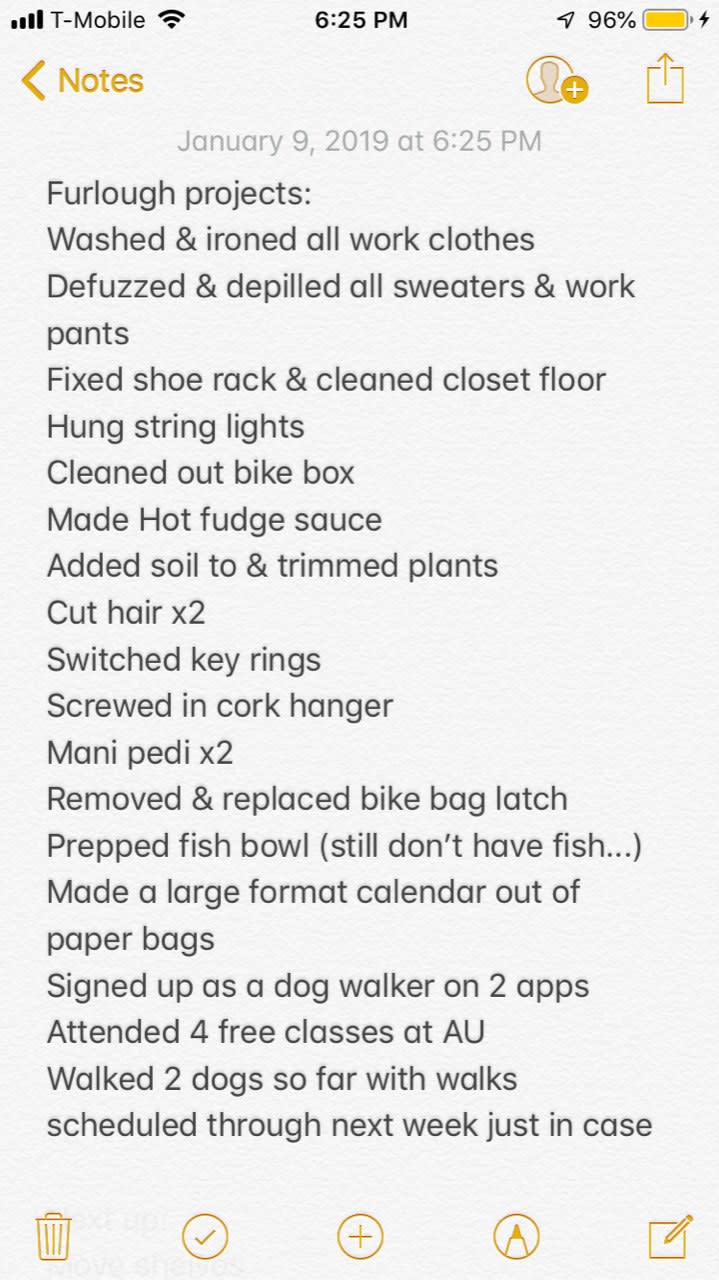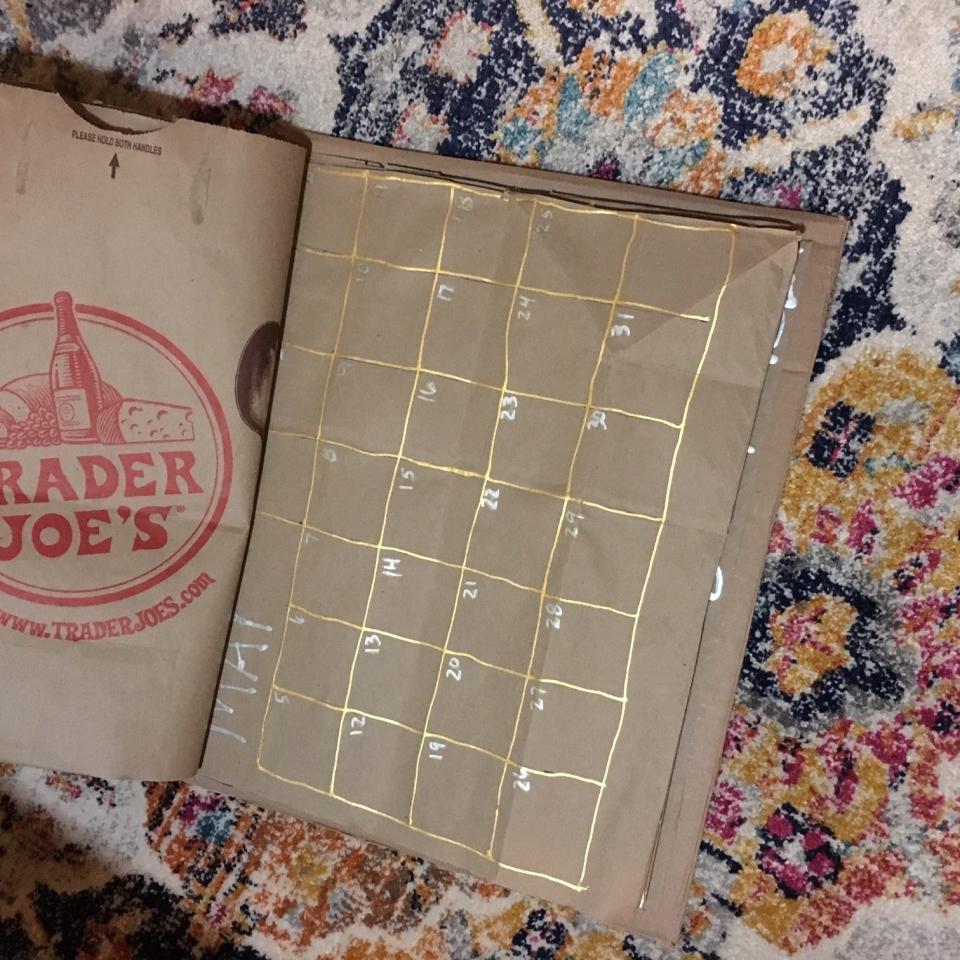These Women Are Still Waiting for Their Paycheck Because of the Government Shutdown
Americans know when the federal government shutdown began: December 22, 2018. What we don’t know as President Donald Trump and Congress remain at odds is when it will end. For many women in public service who are on furlough and now looking at not getting that vital paycheck, the uncertainty can be agonizing. Here are some of the stories furloughed women told Glamour about living, waiting, and trying to get by. They spoke on their own behalf, not for the federal government; some requested partial anonymity out of concern for their jobs.
“We have to be there to pick each other up when systems fail us.”
—Alicia Crain, 38, diversity/equal employment opportunity worker, Washington, D.C.
After serving for years as a development worker in Mexico, Crain relocated to D.C. from Portland in 2016 to take a federal government job as a diversity specialist—a move that ate into her savings. Her take-home pay is about $3,000 a month. She is single and lives by herself. Her rent is $1,225. She spends about $80 for her phone and $50 a month for Internet but doesn’t own a car. Past experiences have taught her about the art of living frugally. Those lessons are getting put to the test during the shutdown.
At first the shutdown was more like vacation. For the first week, week and a half, it was just fine to literally get up, sit on the couch, watch Netflix. I have a really cute little apartment with nice windows, so I have a good place to hang out, which I know isn’t true for lower-level federal employees who are already working [multiple] jobs to make ends meet.
But now it’s been 19 days of just waiting and seeing if I can do my job. I’ll be missing a paycheck, and there seems to be no end in sight. I am in not-great financial circumstances.... If I pay my rent on February 1 [without another paycheck], I’ll almost empty my account; I’d have maybe $200 left. So I’ve signed up as a dog walker on a couple apps to provide a little cash.
[The shutdown] is just sort of maddening and confusing. This is just getting out of hand…. The President is like a two-year-old throwing a temper tantrum: "I will do whatever I want, and I don’t care who I have to hurt to get what I want." That just hit home how self-centered and narcissistic he is…. If there was any sort of empathy, the shutdown would have ended a long time ago.

It’s demoralizing sitting around waiting to be able do my job that I’m good at, that I love, but I am not willing to give in to a narcissistic fascist. Fortunately, my credit union sent a message about all kind of ways to help—paycheck replacement loans, late-fee waivers, a variety of things which I haven’t looked into yet. And my family offered to help when and if I need.
I’ve been getting up without an alarm. I make coffee, make breakfast…. I’ve been organizing, weeding through things, cleaning. I clean a lot. I took all my Christmas decorations down. I washed all of my work clothes and ironed them. Today I decided to make a calendar out of paper bags. I saw [one] somewhere over the weekend and I looked it up, but it was $25.
Yesterday, American University had “Classes Without Quizzes,” a whole day of workshops for furloughed feds, and I ran into a bunch of colleagues there. The great thing about being furloughed in D.C. is many businesses are offering free classes, free food, discounts.
A friend of mine was going out for kind of a nice dinner for Christmas Eve. I did not do that, to save money. I haven’t been eating out. I've been saying no to events, even if they don't cost a lot, like $15—that stuff adds up. I took a bunch of things back to Ikea [for a refund of] $150…. I have definitely made fewer trips to the grocery store. I’m trying to eat what I have. I would prefer not to have to borrow money that I’ll have to pay back, but I guess if it comes to that, I will.

I’m reading A Book of Joy by the Dalai Lama and Desmond Tutu. One of the first things that they talk about is that both have experienced a lot of suffering in their lives. How do you be compassionate while suffering? They both said they remember that they’re not alone in their suffering. There are 450,000 of us [federal employees] affected, and we're all together. If folks need help, reach out. It’s not easy, but relationships are super important…. We have to be there to pick each other up when systems fail us.
“We’re scared and nervous about what the future holds.”
—C., 37, Maryland, international development worker
A few days ago, C., her fiancé, and their son had just moved into a new home in a Washington suburb, with plans to rent out their old one-bedroom condo in D.C. Now she’s without a paycheck, and her partner’s salary won’t stretch far enough to cover both mortgages. When she first heard about the shutdown, the fear set in. Now she's concerned she may not be able to keep the apartment.
I was shocked…. The next week we were closing on a house, so financially, I was panicking. I was sitting up all night watching the news, waiting to see if it was going to happen. My fiancé was like, “Just go to bed. What can you do?” [and] I was like, “We can’t! We have to plan! What are we going to do if it happens?”
My partner works for a private employer, thank goodness. We do have that to fall back on. And this has given me time to really be with my son, which is a positive thing…. [But] just thinking about the workload that I’m going to encounter if [the government] does open up—I work on things that have very strict deadlines and certain numbers have to be met, and so with this happening, my amount of time to do my work is going to be significantly less.
I wake up every day at 3:30 in the morning and have numbers and stress and everything going through my head until 5:30 or 6....
Hearing the stories about the people who have this as their sole income—I can’t imagine the stress that they’re going through. Really, had we just been in our same situation of not buying this new house last week, I would have been completely fine.
But now that we’re in this possible predicament of two mortgages, one paycheck—his paycheck will not pay for two mortgages… I have been every day trying to figure out what we can do to make sure our money is kind of spread out. I make about $80,000 a year [and it’s] about $5,000 a month for two mortgages. He makes about the same as me, $80,000. We definitely rely on both of our checks every single month to make sure we pay for everything.
I wake up every day at 3:30 in the morning and have numbers and stress and everything going through my head until 5:30 or 6, and then somehow it shuts up for a moment, and then it’s time to be with my kiddo…. I definitely have become much more aware of the amount that I’m spending.
The idea of having to sell the condo is pretty upsetting. It’s literally the last resort. There’s nothing that really calms the mind when it comes to this. I have no idea what we’ll do. We don’t have family members who are going to be able to help us pay for things….
I've never owned anything before that [condo]. I've never even owned a car. It was the only thing I’ve ever owned. So of course there's that emotional part toward keeping it, but I have to use my practical side of my brain to make the smart decision, obviously. But it will be hard. It'll be sad to know that I was pushed into that corner to have to put it on the market at this point in time.
The President has no idea what any of us on furlough feel or think or know or agree with or disagree with. He has to talk to us.
We have shelter and we are not going to lose our homes, we hope, but if this continues, we will be forced into doing things we are not prepared to do, like putting our homes on the market and using our credit cards to buy our groceries. We’re scared. We’re nervous about what the future holds for us, and we need to find the calm within the storm. We need to feel supported by our leadership—and I don’t feel that.
“Insecurity about your job takes an emotional toll.”
—Lilibeth Mata, 27, Houston, NASA analyst
Mata has lived through a shutdown before, but this is one of the longer ones she’s seen. She’s looking for side hustles to keep at least some cash coming in as she waits for a resolution. And she has empathy for fellow federal workers who may have it worse.
In September of 2013, literally the week that I got hired, I had my first furlough, so I’ve had this experience before. The very first one was about two weeks long, so that’s something that I was OK with and was kind of prepared for.
Now we’re going into something way longer than I’ve ever had to deal with, and of course it gets you kind of scared and anxious about when you’re going to go back to work and when you’re going to receive your paycheck again. It’s scary how often it’s happening. You think as a civil servant you have really great job security, but in reality they can shut down the government whenever they want. More than anything, it’s sort of the emotional toll of the insecurity in your job.
Coming right after the holidays, the timing of this shutdown is extra harsh.
Finance-wise, you’re digging into those savings, and especially right now, at the beginning of the year. For me, my six-month car insurance payment hits in January, the homeowner’s bill for the entire year. I also help my parents out, because they’re both retired and just kind of depend on their Social Security. And coming right after the holidays, the timing of this shutdown is extra harsh.

I think I’ll be OK, but I have to prioritize certain things to make that happen. And I also have been trying to look for little jobs—just kind of odds and ends to make a little bit of extra cash. I have a friend who’s an event coordinator, so I have helped her with two events throughout these few weeks, a wedding and a New Year’s party. I set up the decorations, I ushered people around, and I catered to the bride, groom, and family. And I’m trying to see if any friends need math tutors or anything.
I’m aware that shutdowns happen. It’s starting to get to the point that the length of it is getting scary. Everything that I hear in the news doesn’t sound like we’re coming any closer to a resolution. In the past we’ve gotten back pay, but it’s never a guarantee.
Besides worrying about myself, I worry about my friends—both husband and wife are NASA employees and they have a child. I know there’s people who are even worse off than me because they have an entire family and their whole entire income comes from the federal government. As bad as I have it, I know there are people who have it worse.
“My son’s like, ‘I love Furlough Mommy!'”
—L., 39, Virginia, budget manager
A mother of two who describes herself as always having been very career-oriented, L. has been in federal service long enough to have seen shutdowns before. Her husband’s salary keeps the family out of financial peril—so she admits time away from the job has actually made her less stressed, not more.
My husband can cover our mortgage, our basics. Ironically, the day before the shutdown, he got an offer for a government position, but he didn’t hear the phone. He wanted that job for a long time, but it actually worked out that he hadn’t gone there earlier, because then he would have been furloughed too. If this went on for months and months and months, yeah, it would be bad. But another week or two, even the end of the month, is not earth-shattering. The main thing coming out of my checking account is my student loans I pay every month, and student loans you can pretty easily freeze, so that’s what I did.
Normally, I’m out of the house by the time my kids even wake up. I have a four-year-old in day care and an 11-year-old who goes to school. Now I can get up with them, help them start their day, get them off onto the bus. I decided I’m going to hit the gym every day I’m furloughed. I’ve personally been trying really hard to be productive. I’ve done a lot of painting in my house. Me and some of my friends, we hold ourselves accountable for getting up and doing things. If you lounge around, you can become depressed because you feel like you’re not contributing, you’re not being productive in society. So I’ve just been go, go, go. Go to the gym. Tidy up my house. It makes the day go fast.
If you lounge around, you can become depressed because you feel like you’re not contributing...so I’ve just been go, go, go.
This is really cheesy, but I feel like I’ve kind of had some time to be a better mom. Because usually, I’m so harried and stressed, and they’re like, “I need this, I need this.” When you get home from work, you’re like, “When am I going to do all these things?” Well, you know what? My son needed something, and I leisurely went to Target today and got it for him. I’m going to be here when he gets home. I’ve always been like a career person. I’m not usually very touchy-feely. So I have to say this is honestly the most connected I’ve ever felt with my kids. My son’s like, “I love Furlough Mommy!”
When I go back to my job, what I hope to take with me is realizing that when I bring home stress from work, that it impacts everybody, and realizing how, because I’m really calm right now, that improves the mood of the whole family. I’m going to try really hard to take that as a lesson learned: When I come home from work, just let it go.
“This was a dream job. But the furlough has made me question that.”
—Bonnie Nesbitt, 36, New York City, underwriter, U.S. Department of Housing and Urban Development
It’s the feeling of being in professional and financial limbo that’s frustrating for Nesbitt, a new HUD employee who is among the federal workers who, amid the uncertainty, has decided to take the step of seeking unemployment benefits to prevent her from draining away money she’s saved toward other life goals, including buying a home.
I started this job just two months ago, October 29, 2018. The whole situation is frustrating and unnerving since there’s no gauge to sense when we could be back to work. This feeling of being in limbo, everything’s been put on hold with no foreseeable end in sight; it’s something I’ve never experienced before.
My whole professional career has been in the affordable housing industry, so when I landed this federal gig, it was a dream job. As far as public-sector work goes, federal positions are kind of the gold standard, in my opinion. This was a career-changing move that I was, and still am, very excited about. But to leave a job to take the next step in my career, only to fall into a trap of no employment and no pay for an undetermined amount of time, has honestly made me question my move.

Financially, I am among the privileged where I do have savings I could reallocate to cover my expenses (rent, high student loan payment, some credit cards, along with basic items like food, etc.)—but not for months on end.
Additionally, my partner Will and I were in the process of applying to buy into a co-op apartment in Queens before the shutdown went into effect. The money we have saved has been designated to cover our down payment and closing costs. I transferred roughly $2,000 of that designated money to my checking account yesterday to cover bills for the next couple weeks. I can’t keep that up for weeks or months on end.
[Losing the co-op is] definitely a concern. Co-op boards look for purchasers to have a certain amount of postclosing liquidity, and if I keep having to tap into savings to make ends meet, it could potentially put our transaction in jeopardy. We’re too far along into the process to back out now though, so I have to keep extraneous spending to a minimum and stay optimistic we’ll be back to work sooner than later.
I decided today to file for unemployment benefits to help cover some bills. It will help—that’s why we pay into these social safety nets so they’re there when we do need them—but after taxes, it won’t be close to matching my regular take-home pay.
Celeste Katz is senior politics reporter for Glamour. Send tips and questions to Celeste_Katz@condenast.com.
Lead photo: Getty Images

